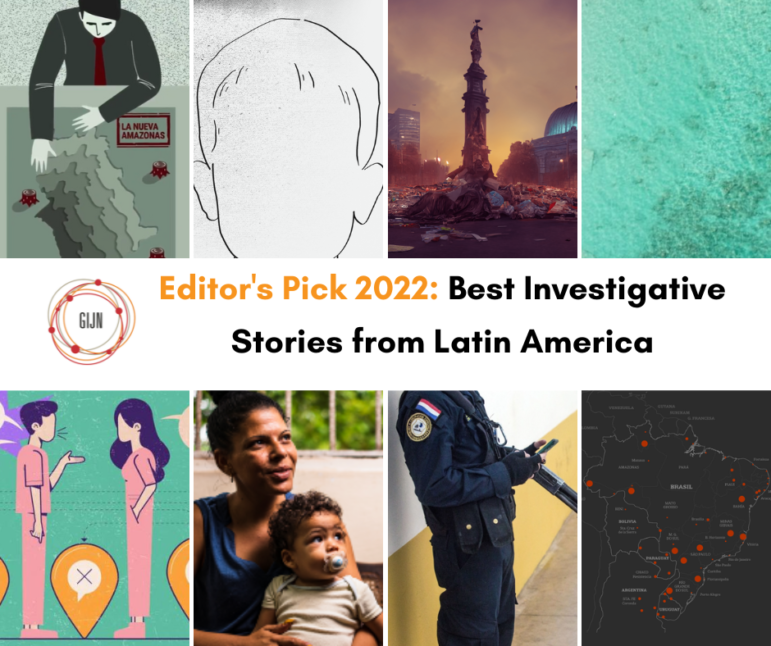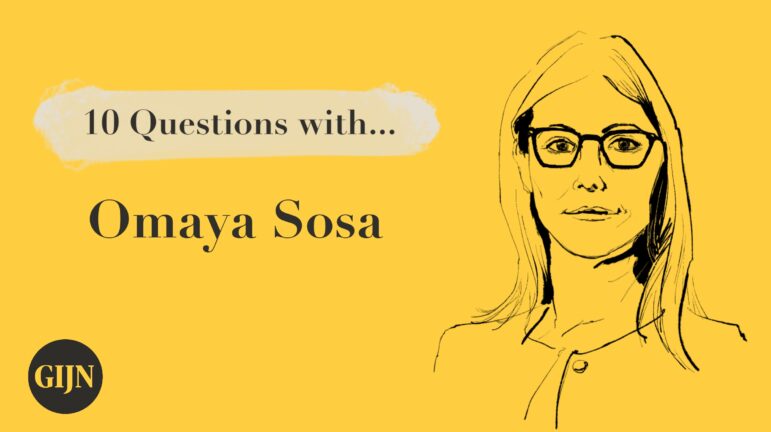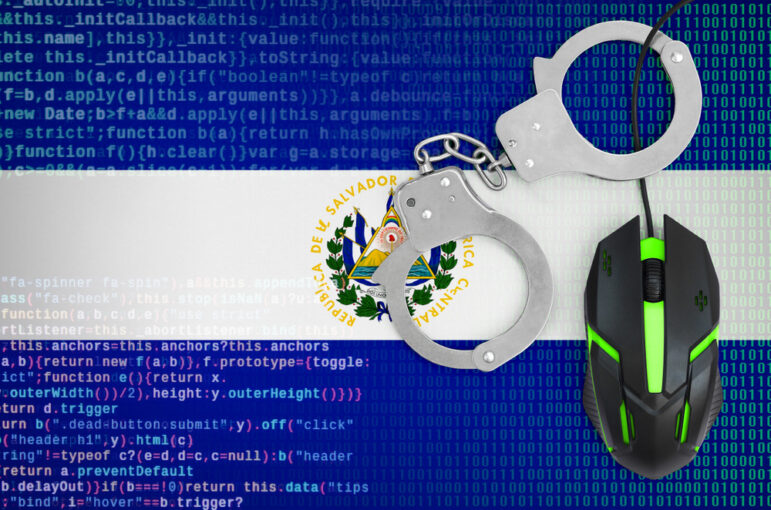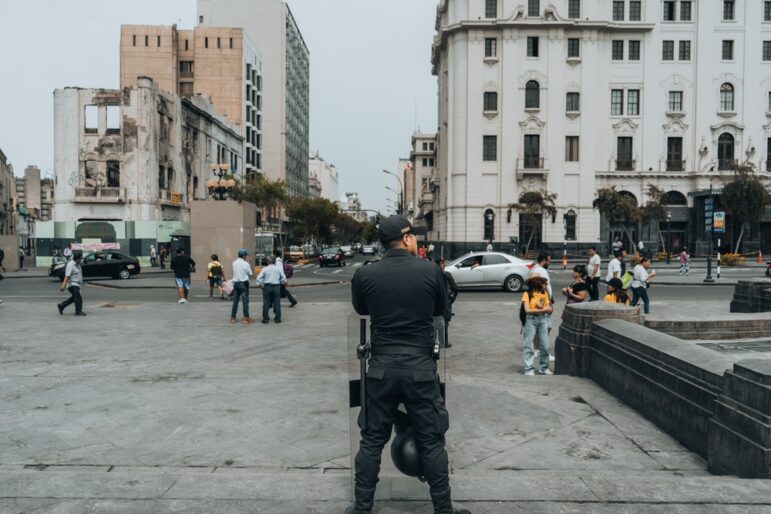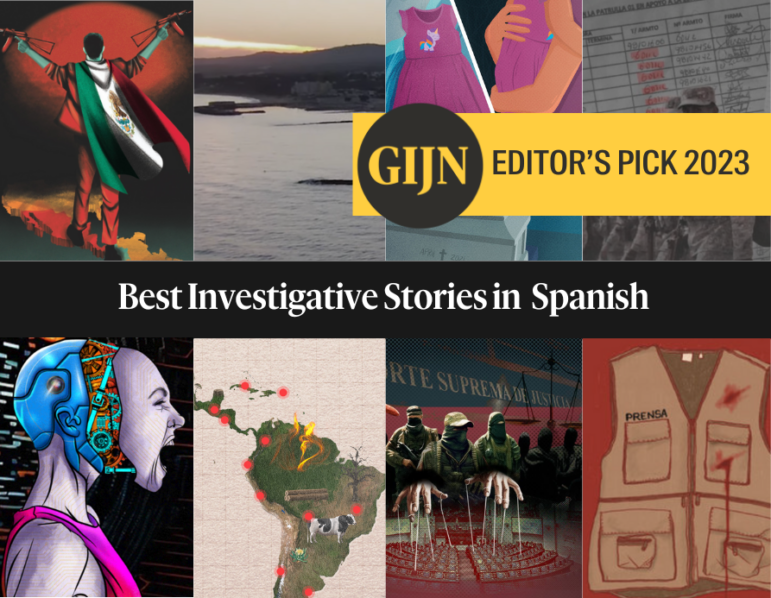

Image: GIJN
NarcoFiles, Political Influencers, Digital Mercenaries: 2023’s Best Investigative Stories from Spain and Latin America
Read this article in
Journalism in the Spanish-speaking world is thriving, as this round-up of the top investigative stories produced in the language in the last year shows.
Our selection takes readers from the Mexican Caribbean, where reporters investigated the impact of deforestation, to Spain’s Costa del Sol, where a podcast dove deep on the dynamics of drug dealing in Europe. Also on our are list are stories about Guatemala’s prisons and a notable — and sizable — cross-border collaboration on the drugs trade.
But despite the strength of these stories, and the vibrancy of the investigative sector in general, it’s important to point out that the threats that reporters face covering these types of stories, particularly in Latin America, are ominous.
In 2023, reporters from Argentina in the south of the continent to Mexico in the north faced threats, harassment, and violence for their work.
According to Reporters Without Borders (RSF), an “acute security crisis” in Haiti has made reporting increasingly dangerous, while in Ecuador the growing influence of criminal gangs has dialed up threats to the press. In Mexico, RSF says, “the extreme violence of the cartels and their frequent collusion with local officials and politicians, has continued journalism’s destruction.”
However, reporters in the region have shown great resilience and determination despite these obstacles.
“Given the difficult conditions for doing journalism in Latin America, it is inspiring to see that investigations are more alive than ever,” said Christopher Acosta, a Peruvian investigative journalist and the coordinator of the IPYS Latin American Conference of Investigative Journalism (COLPIN). “The journalism getting done here is brave, professional, and [reporters] have a lot to share with the world.”
It was extremely hard to choose only eight stories, so for this selection we prioritized a diversity of content, location, and format, with this list featuring a podcast, a video game, data visualizations, and long reads alongside traditional reporting.
NarcoFiles (Regional)
Latin America is a region where the problem of drug trafficking, and the violence and corruption it entails, looms large. For this series — one of the largest investigative projects on organized crime to originate from the region — more than 40 outlets collaborated to investigate a leak of more than seven million emails from the Colombian Public Prosecutor’s Office. The investigation sheds light on the war against drugs and provides a glimpse into the nature of the trade, showcasing how criminal groups are collaborating, networking, and operating. Stories include the production of cocaine in new laboratories in the region, how a Dutch hacker allegedly infiltrated IT systems to enable smuggling through European ports, and the export of Colombian cocaine “experts” to different countries. The project, led by the Organized Crime and Corruption Reporting Project (OCCRP) with Centro Latinoamericano de Investigación Periodística (CLIP), brought together dozens of journalists from 23 countries. More than 50 stories have been published so far.
Ayacucho: X-ray of Homicides (Peru)
At the end of last year, as a political crisis hit Peru, thousands of people took to the streets to march. But some of the protests turned violent amid allegations of excessive use of force by the security forces. This investigation by IDL-Reporteros is a comprehensive report digging into six of the 10 deaths that occurred on December 15 2022 in the southern city of Ayacucho. For this video report, which won first place at the Javier Valdez Awards at Colpin in 2023, the outlet identified the scenes, locations, and precise moments from which the fatal shots were fired during seven hours in which the protests turned deadly. Warning: The video contains graphic footage.
Corruption and Punishment (Colombia)
The investigative project by Cuestion Publica was named after Fyodor Dostoevsky’s famous novel “Crime and Punishment,” and quotes from the book pepper the site. The aim of the project — which included collaborations with sites like investigative outlet 360-grados.co — was presented in a videogame format as “Guess who I am?” and was focused on digging into who inherited the political influence of the paramilitaries, the powerful right-wing groups that emerged during Colombia’s long civil conflict. Innovative in form and content, users try to reveal hidden cards, which leads them to uncover political relationships.
To create the game, a database was built of the 143 congressmen and women involved in judicial proceedings, including those currently being investigated. The data was extracted from sentences issued by the Supreme Court of Justice, trials carried out by the Prosecutor’s Office, testimonies given before the country’s peace tribunal, records of the National Center of Historical Memory, and press reports. It was published in partnership with Transparencia por Colombia, based on information published by Verdad Abierta and Rutas del Conflicto.
Babies in Prison (Guatemala)
April was born inside a jail and died when she was only six months old “from rotavirus,” according to a medical report given to mother. However, the investigative team working on this story, which dug into the treatment of babies who live in Guatemalan prisons alongside their mothers, was told the infant died because of a “pulmonary edema.” The story of this baby, and others like her who spend their lives behind bars, is told in this collaboration from Plaza Pública, Factor 4, Nuestras Historias, Prensa Comunitaria, Revista Ruda, and Connectas. The project uses text alongside multimedia material, such as videos and audio footage, to explore how infants often live in unhealthy conditions, where babies get sick easily, and in conditions in which incarcerated moms complain of lack of food during the weekends.
Cause of Death: Questioning Power (Mexico)
Mexico is one of the most dangerous countries in the world to be an investigative reporter, and many journalists, especially those working on local stories that touch on crime and corruption are harassed, intimidated, and even murdered. Journalist Alejandra Ibarra Chaoul was tired of hearing the excuse that “it is organized crime or local politicians that kills these reporters,” and wanted to dig deeper to understand why some reporters are killed and others survive. In her book — the result of more than five years of research — Ibarra delves into profiles of local journalists who have made life uncomfortable for the elite in their towns and cities, highlighting the risk factors of being a respected voice among the community, taking a stand, questioning power, and in particular, doing so at a time when a place is going through a period of instability.
Digital Mercenaries (Regional)
From troll factories to politically connected consultants, and everything in between, the world of digital mercenaries is vast, ever-changing, and profitable. In this high-stakes setting, where everything from votes to reputations are up for grabs, who are the power players and what motivates them? This cross-border collaborative project — created by independent media outlets from across Latin America — digs into this murky world to reveal the tricks used and how transnational manipulators influence millions of citizens in their political choices. To show their findings in each country, reporters used text, videos, podcasts, and webinars. Stories include an investigation into how an international network spread disinformation related to an attempted coup in Brazil and how allies of the Spanish right-leaning political party Vox spread misinformation in Latin America. To do it, journalists tracked down online details of international consultants, consulted documents on campaign hiring, followed trolls for many months to find out how they were operating, and attended political marketing campaign events.
Costa Nostra (Spain)
Spain’s Costa del Sol is a tourist paradise, known for its beaches, crystal blue waters, and nightlife. But this podcast series from the journalist Antonio Pampliega explores the “dark side” of this stretch of coastline, where organized crime groups from more than 50 countries traffic illegal substances and battle with each other for control. Over the course of 10 episodes, the reporter meets drug traffickers, gangsters, and police officers who live and work on these world-famous beaches. The podcast was created by La Maldita, an outlet specializing in film, podcasts, and documentaries based between Madrid and Buenos Aires.
The Forests We Have Lost (Regional)

Image: Screenshot, graphic design by Alma Ríos, Rocío Rojas, Gabriela Rodríguez / Distintas Latitudes and 6ta generación RedLATAM
Distintas Latitudes, in collaboration with Mongabay, crafted this thought-provoking and beautifully designed investigation on the impact of deforestation in Latin America and the Caribbean. Through requests for information from governments, interviews with specialists, and data obtained from the Global Forest Watch platform, the team built two databases that reflect the speed of deforestation in 12 countries in the region between 2001 and 2021. The scale of the loss in the region — which is home to more than 50% of the biodiversity and primary rainforests in the world — is stark. Colombia alone, they report, has lost forests equivalent to 125 times the area of the city of Medellin in two decades. The multimedia investigation was carried out by 50 people, including journalists and designers.
 Andrea Arzaba is a journalist and GIJN’s Spanish Editor. As a reporter and media professional, she has focused on documenting the stories of people in Latin America and Latinx communities in the US. She is an International Women’s Media Foundation fellow and part of Transparency International’s Young Journalists Program.
Andrea Arzaba is a journalist and GIJN’s Spanish Editor. As a reporter and media professional, she has focused on documenting the stories of people in Latin America and Latinx communities in the US. She is an International Women’s Media Foundation fellow and part of Transparency International’s Young Journalists Program.

